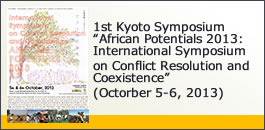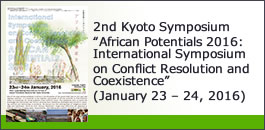[21th Plenary Committee Meeting / 2nd Kyoto Symposium] “African Potentials 2016: International Symposium on Conflict Resolution and Coexistence” (January 23 – 24, 2016)
Date: January 23 – 24, 2016
Venue: Large meeting room (333) on 3rd floor of Inamori Foundation Memorial Hall, Kyoto University
Outline
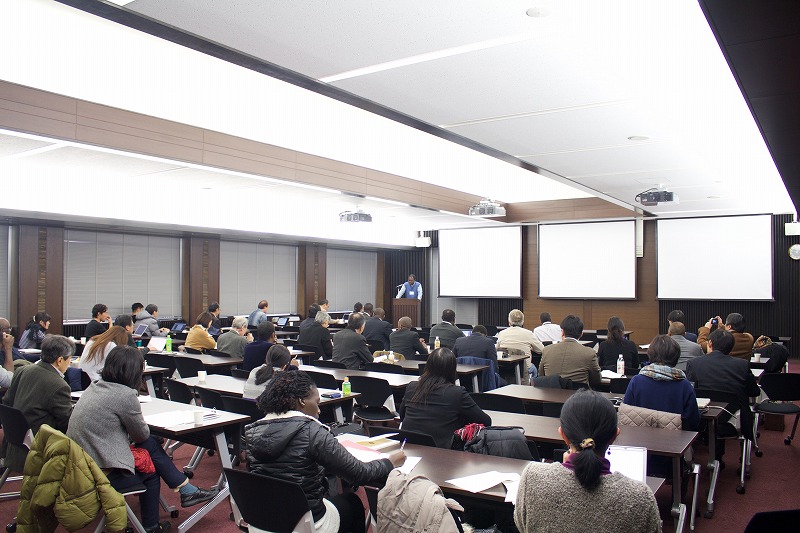
This research project started in 2011 as a five-year project, and this symposium was held in Kyoto as the final international symposium. The meeting had two objectives.
In this research project, we held ‘African Forums’ annually in different cities in African countries, inviting African researchers, in order to strengthen our idea of ‘African Potentials.’ In this process, a group of regular members was created, which provoked serious discussions, and deepened our thoughts on ‘African Potentials’. In this Kyoto symposium, we invited these regular members to finalize our discussion on ‘African Potentials,’ and to exchange our ideas how we can proceed in future. This is the first objective of this symposium. These regular members are:
- Edward Kirumira (Makerere University, Uganda)
- Kennedy Mkutu (United States International University, Kenya)
- Michael Neocosmos (Rhodes University, South Africa)
- Samson Wassara (University of Bahr El Ghazal, South Sudan)
- Francis Nyamnjoh (University of Cape Town, South Africa)
- Yntiso Gebre (Addis Ababa University, Ethiopia)
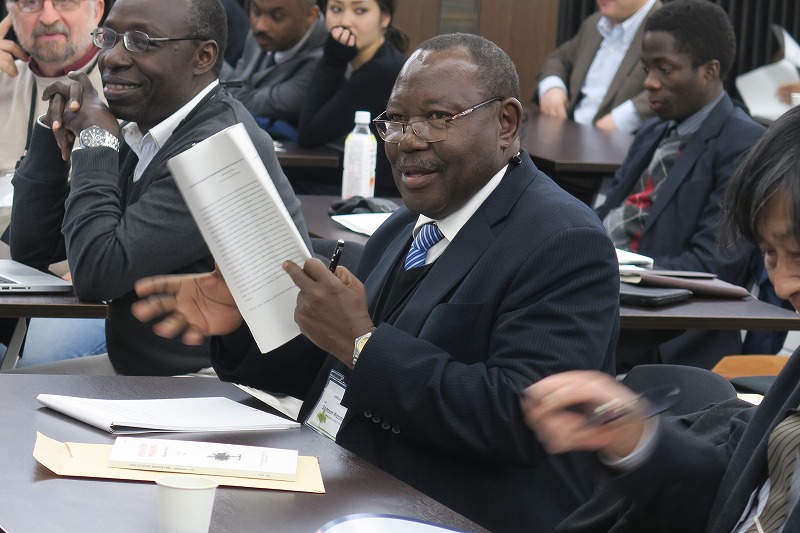
The second objective of this symposium was to announce the publication of five books in Japanese, as a result of this research project which had more than 50 Japanese members. These books will come out by the end of March 2016, published by Kyoto University Press. The project leader and five editors of these five books made presentations in which results of this project were summarized.
In the end of this symposium, presenters of the meeting agreed to publish a book on ‘African Potentials’ in near future in English.
Program
January 23 (Saturday), 2016
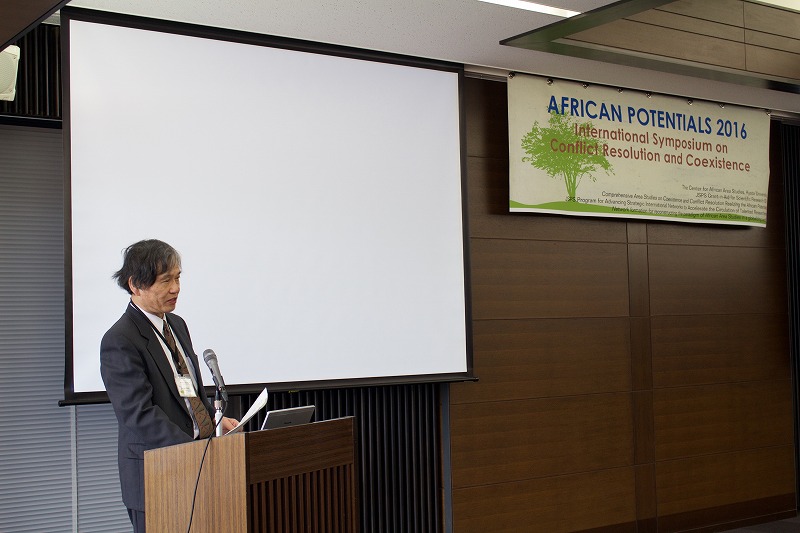
- 10:30 – 10:40
- Welcome Address: Shigeki Kaji (Kyoto University)
- 10:40 – 10:55
- Opening Remarks: Itaru Ohta (Kyoto University)
- 10:55 – 11:00
- Introduction of the Keynote Speaker: Motoji Matsuda (Kyoto University)
- 11:00 – 11:45
- Keynote Speech: Edward Kirumira (Makerere University)
African Potentials and Sustainable Development - 11:45 – 12:00 Discussion
- 12:00 – 13:30 Lunch
- 13:30 – 14:05 Kennedy Mkutu (United States International University)
- New Challenges for African Potentials in Meditating Cross Border Conflicts
- 14:05 – 14:40 Michael Neocosmos (Rhodes University)
- The Universality of Humanity as an African Political Potential
- 14:40 – 15:15 Samson Wassara (University of Bahr El Ghazal)
- African Potential in Negotiating Statehood: Handling Crises of South Sudan
- 15:15 – 15:35 Break
- 15:35 – 16:10 Francis Nyamnjoh (University of Cape Town)
- Incompleteness and Conviviality: A Reflection on International Research Collaboration from an African Perspective
- 16:10 – 16:45 Yntiso Gebre (Addis Ababa University)
- Systematizing Knowledge about Customary Laws in Africa: The Case of Ethiopia
- 16:45 – 17:10
- Comments (by five Japanese scholars on above five presentations: 5 minutes each)
- 17:15 – 18:15
- Discussion
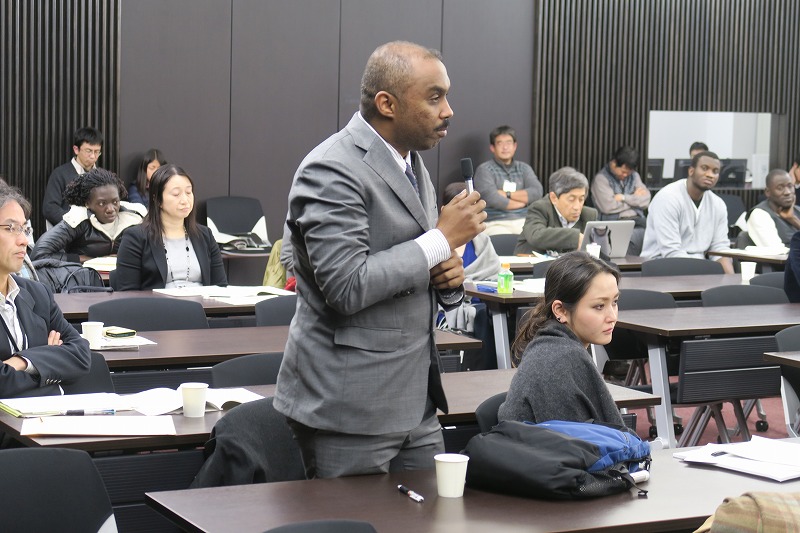
January 24 (Sunday), 2016
- 10:00 – 10:35 Itaru Ohta
- “Liberal Peace” Debates and African Potentials for Materializing Coexistence
- 10:35 – 11:10 Motoji Matsuda (Kyoto University)
- Cultural Creativity for Conflict Resolution and Coexistence: From the Viewpoint of African Potentials
- 11:10 – 11:45 Shinichi Takeuchi (Institute of Developing Economies)
- African Potential as an Analytical Perspective
- 11:45 – 12:20 Motoki Takahasi (Kobe University)
- People as Lithe Agents of Change: African Potential for Development and Coexistence
- 12:20 – 13:50 Lunch
- 13:50 – 14:25 Masayoshi Shigeta (Kyoto University)
- How People Can Achieve the Coexistence through the Sound Use of Resources?
- 14:25 – 15:00 Gen Yamakoshi (Kyoto University)
- Who Owns African Nature? African Perspectives on the Future of Community-Based Conservation
- 15:00 – 15:20 Break
- 15:20 – 16:20
- Comments on these six presentations by six African scholars
- 16:20 – 17:00 General Discussion
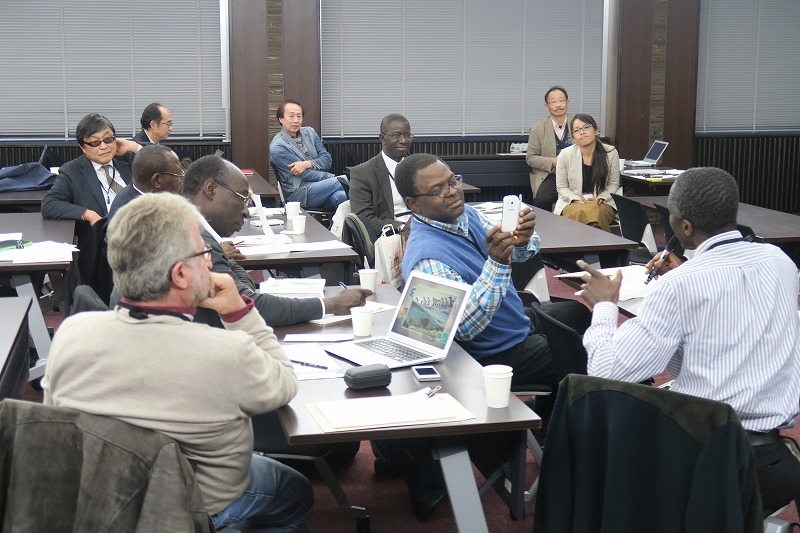
[2nd Kyoto Symposium / 21th Plenary Committee Meeting] “African Potentials 2016: International Symposium on Conflict Resolution and Coexistence” (January 23 – 24, 2016)
Date: January 23 – 24, 2016
Venue: Large meeting room (333) on 3rd floor of Inamori Foundation Memorial Hall, Kyoto University
Outline

This research project started in 2011 as a five-year project, and this symposium was held in Kyoto as the final international symposium. The meeting had two objectives.
In this research project, we held ‘African Forums’ annually in different cities in African countries, inviting African researchers, in order to strengthen our idea of ‘African Potentials.’ In this process, a group of regular members was created, which provoked serious discussions, and deepened our thoughts on ‘African Potentials’. In this Kyoto symposium, we invited these regular members to finalize our discussion on ‘African Potentials,’ and to exchange our ideas how we can proceed in future. This is the first objective of this symposium. These regular members are:
- Edward Kirumira (Makerere University, Uganda)
- Kennedy Mkutu (United States International University, Kenya)
- Michael Neocosmos (Rhodes University, South Africa)
- Samson Wassara (University of Bahr El Ghazal, South Sudan)
- Francis Nyamnjoh (University of Cape Town, South Africa)
- Yntiso Gebre (Addis Ababa University, Ethiopia)

The second objective of this symposium was to announce the publication of five books in Japanese, as a result of this research project which had more than 50 Japanese members. These books will come out by the end of March 2016, published by Kyoto University Press. The project leader and five editors of these five books made presentations in which results of this project were summarized.
In the end of this symposium, presenters of the meeting agreed to publish a book on ‘African Potentials’ in near future in English.
Program
January 23 (Saturday), 2016

- 10:30 – 10:40
- Welcome Address: Shigeki Kaji (Kyoto University)
- 10:40 – 10:55
- Opening Remarks: Itaru Ohta (Kyoto University)
- 10:55 – 11:00
- Introduction of the Keynote Speaker: Motoji Matsuda (Kyoto University)
- 11:00 – 11:45
- Keynote Speech: Edward Kirumira (Makerere University)
African Potentials and Sustainable Development - 11:45 – 12:00 Discussion
- 12:00 – 13:30 Lunch
- 13:30 – 14:05 Kennedy Mkutu (United States International University)
- New Challenges for African Potentials in Meditating Cross Border Conflicts
- 14:05 – 14:40 Michael Neocosmos (Rhodes University)
- The Universality of Humanity as an African Political Potential
- 14:40 – 15:15 Samson Wassara (University of Bahr El Ghazal)
- African Potential in Negotiating Statehood: Handling Crises of South Sudan
- 15:15 – 15:35 Break
- 15:35 – 16:10 Francis Nyamnjoh (University of Cape Town)
- Incompleteness and Conviviality: A Reflection on International Research Collaboration from an African Perspective
- 16:10 – 16:45 Yntiso Gebre (Addis Ababa University)
- Systematizing Knowledge about Customary Laws in Africa: The Case of Ethiopia
- 16:45 – 17:10
- Comments (by five Japanese scholars on above five presentations: 5 minutes each)
- 17:15 – 18:15
- Discussion

January 24 (Sunday), 2016
- 10:00 – 10:35 Itaru Ohta
- “Liberal Peace” Debates and African Potentials for Materializing Coexistence
- 10:35 – 11:10 Motoji Matsuda (Kyoto University)
- Cultural Creativity for Conflict Resolution and Coexistence: From the Viewpoint of African Potentials
- 11:10 – 11:45 Shinichi Takeuchi (Institute of Developing Economies)
- African Potential as an Analytical Perspective
- 11:45 – 12:20 Motoki Takahasi (Kobe University)
- People as Lithe Agents of Change: African Potential for Development and Coexistence
- 12:20 – 13:50 Lunch
- 13:50 – 14:25 Masayoshi Shigeta (Kyoto University)
- How People Can Achieve the Coexistence through the Sound Use of Resources?
- 14:25 – 15:00 Gen Yamakoshi (Kyoto University)
- Who Owns African Nature? African Perspectives on the Future of Community-Based Conservation
- 15:00 – 15:20 Break
- 15:20 – 16:20
- Comments on these six presentations by six African scholars
- 16:20 – 17:00 General Discussion

[5th African Forum: Addis Ababa] “Local Knowledge as African Potentials” (October 31 – November 1, 2015)
Date:October 31 – November 1, 2015
Venue:Siyonat Hotel, Addis Ababa, Ethiopia
Outline
This project organizes the African Forums on Conflict Resolution and Coexistence once each year in Africa. These forums have been instrumental in furthering international discussions with African researchers and working-level personnel. They have also played an important role in moving our research forward and deepening our understanding of what is actually happening in Africa. The first forum was held in Nairobi in December 2011, the second in Harare in December 2012, the third in Juba in December 2013, the fourth in Yaoundé in December 2014, and the fifth in Addis Ababa in October and November 2015. The 2015 forum was made possible thanks to the close and cooperative relationship Japanese researchers have built with the Institute of Ethiopian Studies and the Departments of Sociology and Social Anthropology at Addis Ababa University. It was co-organized by the Grant-in-Aid for Scientific Research (A) Project: Engaged Area Studies in the Arena of African Local-Knowledge Formation and Sharing, led by Masayoshi Shigeta of Kyoto University.
The fifth forum was titled “Local Knowledge as African Potential.” Although previous forums have explored African potential that can be utilized to achieve conflict resolution and coexistence, this forum also considered African potential in areas not directly related to conflict, such as local knowledge, technology, and systems that support the livelihoods of Africans.
The two-day forum began with a keynote speech titled “Local Knowledge as Untapped Potential for Entrenching Development and Conflict Prevention and Resolution: The Ethiopian Experience” delivered by Berhanu Kassahun, professor at Addis Ababa University, in which he discussed the rich potential embedded in local knowledge found in Ethiopian societies and its relation to development and conflict prevention and resolution. This was followed by oral presentations by eleven African researchers and eight Japanese researchers, and impassioned discussions on topics such as how to define African potential, local knowledge, and tradition.
The first day of the forum focused mainly on Ethiopia, with oral presentations across three common themes: “Friction between modern school education and local communities,” “Conflicts on land issues,” and “Local knowledge and development.” The second day consisted of a review of all five African Forums on Conflict Resolution and Coexistence carried out by this research project so far, and intense debates on what has been discussed and what problems still remain.
Program
31st October 2015
- 9:00-9:10 OPENING REMARKS
- OHTA Itaru (Center for African Area Studies, Kyoto University)
- 9:10-9:20 WELCOME ADDRESS
- AHMAD Hassan (Institute of Ethiopian Studies, Addis Ababa University)
- 9:20-10:00 KEYNOTE SPEECH
- Local Knowledge as Untapped Potential for Entrenching Development and Conflict Prevention and Resolution: The Ethiopian Experience
KASSAHUN Berhanu (Department of Political Science and International relations, Addis Ababa University) - 10:00-10:15 COFFEE BREAK
- 10:15-11:45 SESSION 1: FRICTION BETWEEN MODERN SCHOOL EDUCATION AND LOCAL COMMUNITIES
Chaired by GEBRE Yntiso (Department of Social Anthropology, Addis Ababa University) - 1) LOCAL KNOWLEDGE AS A MODE OF COEXISTENCE: THE ACCEPTANCE OF MODERN SCHOOL EDUCATION KANEKO Morie (Graduate School of Human and Environmental Studies, Kyoto University) & SHIGETA Masayoshi (Center for African Area Studies, Kyoto University)
- 2) PHYSICALLY EDUCATED TO BE COEXISTED: DYNAMICS OF DISCIPLINE IN THE KENYAN YOUTH IN SPORTS TRAINING SCHOOL
HAGIWARA Takuya (JSPS Research Fellow/Institute for Research in Humanities, Kyoto University) - 3) RESETTLEMENT AND ETHNIC RELATIONS IN JAWI WOREDA, AMHARA REGIONAL STATE
YOHANNES Yitbarek (South Omo Research Center/Arba Minch University)
Commentator: Edward Kirumira (Makerere University) - 11:45-13:00 LUNCH
- 13:00-14:30 SESSION 2: CONFLICTS ON LAND ISSUES I
Chaired by MATSUDA Motoji (Graduate School of Letters, Kyoto University) - 1) PERCEPTIONS, OPPORTUNITIES AND CHALLENHES OF SEDENTARIZATION IN HAMER, SOUTHWESTERN ETHIOPIA
SAMUEL Tafara (Center for African and Oriental Studies, Addis Ababa University) - 2) WAR AND TRADE
SOGA Toru (Faculty of Humanities, Hirosaki University) - 3) URBAN LAND TRANSACTION, ACTORS’ CONFLICT AND SOME APPROACHES TO RESOLUTION
TESHOME Emana (Addis Ababa University)
Commentator: KURIMOTO Eisei (Graduate School of Human Science, Osaka University) - 14:30-14:45 COFFEE BREAK
- 14:45-16:15 SESSION 3: CONFLICTS ON LAND ISSUES II
Chaired by Kennedy Mkutu (United States International University) - 1) FORUM PREFERENCE/SHOPPING FOR DISPUTE SETTLEMENT BY THE RURAL COMMUNITY: THE CASE OF THE TULAMA OROMO OF ETHIOPIA
MELAKU Abera (Addis Ababa University) - 2) LAND REGISTRATION/CERTIFICATION AND THE MAKING OF ‘INTIMATE ENEMIES’: ON POTENTIALS AND CHALLENGES OF LOCAL ELDERS IN DEALING WITH LAND DISPUTES IN WEST ARSII, SOUTHERN ETHIOPIA MAMO Hebo (Department of Social Anthropology, Addis Ababa University)
- 3) LAND RUSH AND THE FRONTIER PROCESS AMONG THE DASANACH OF SOUTHWESTERN ETHIOPIA
SAGAWA Toru (Faculty of Letters, Keio University)
Commentator: Michael Neocosmos (Rhodes University) - 16:15-16:30 COFFEE BREAK
- 16:30-18:00 SESSION 4: LOCAL KNOWLEDGE AND DEVELOPMENT
Chaired by Sam Moyo (African Institute for Agrarian Studies) - 1) TOURISM AND LARGE-SCALE DEVELOPMENT IN SOUTHWESTERN ETHIOPIA:CULTURAL TOURISM BY ARI PEOPLE
NISHIZAKI Nobuko (Fukushima University) - 2) PROPOSAL OF ENGAGED AREA STUDY TO CREATING A NEW CULTURE OF WORK FOOTWEAR IN AFRICA:SHARING LOCAL KNOWLEDGE FOR INTRODUCING JIKA-TABI TO ETHIOPIAN OX-PLOUGH FARMER
TANAKA Toshikazu (Center for African Area Studies, Kyoto University) - 3) THE ENSET PARK ESTABLISHMENT INITIATIVE: AN APPROACH THAT STARTED TO BENEFIT PROPLE AND BIOLOGICAL DIVERSITY
FELEKE Woldeyes (Arba Minch University)
Commentator: Francis Nyamnjoh (University of Cape Town) - 18:00-18:30 GENERAL DISCUSSION
- 9:30 – 9:40 Introduction: Research Project on “African Potentials”
- OHTA Itaru (Center for African Area Studies, Kyoto University)
- 9:40 – 10:20 On all the five African Forums on “African Potentials”
- MATSUDA Motoji (Graduate School of Letters, Kyoto University)
- 10:20 – 10:35 COFFEE BREAK
- 10:35 – 11:05 On the 1st African Forum in Nairobi in 2011
- Kennedy Mkutu (United States International University)
- 11:05 – 11:35 On the 2nd African Forum in Harare in 2012
- Sam Moyo (African Institute for Agrarian Studies)
- 11:35 – 12:05 On the 3rd African Forum in Juba in 2013
- KURIMOTO Eisei (Graduate School of Human Science, Osaka University)
- 12:05-13:35 LUNCH
- 13:35-14:05 On the 4th African Forum in Yaounde in 2014
- Francis Nyamnjoh (University of Cape Town)
- 14:05-14:35 On the 5th African Forum in Addis Ababa in 2015
- GEBRE Yntiso (Department of Social Anthropology, Addis Ababa University)
- 14:35 – 14:50 COFFEE BREAK
- 14:50-15:50 GENERAL DISCUSSION
- Discussant: Bekele Gutema (Department of Philosophy, Addis Ababa University)
Facilitator: OHTA Itaru
1st November 2015
[7th Meeting of Cluster on Southern Africa / 20th Public Workshop] “Long-term field study of ring-tailed lemurs in southern Madagascar” (Co-organized by the 206th Regular Seminar of the Center for African Area Studies) (November 20, 2014)
Date: November 20, 2014. 15:00 – 17:00
Venue: Middle-sized seminar room, 3F Inamori Center, Kyoto University
Program
Title: Long-term field study of ring-tailed lemurs in southern Madagascar
Presenter: Shinichiro Ichino (Kyoto University)
Abstract
Madagascar is a large island which is 1.6 times larger than the whole area of Japan and characterized by biodiversity with high endemism. In spite of that, it is estimated that Madagascar has lost more than 90% of its original forest. At Berenty Reserve in southern Madagascar, a field study of a diurnal prosimian, ring-tailed lemurs (Lemur catta), has been conducted since 1989. In this presentation, I introduce results of the long-term study; for example, longevity, life history traits and population dynamics of this endangered species. And I also discuss how long-term field study can contribute to forest ecosystem conservation in Madagascar.
[13th Meeting of Research Unit on Politics and International Relations / 23rd Public Workshop] “Land and Agrarian Reform in Zimbabwe: Social and Structural Implications” (March 9, 2015)
Date: March 9 (Monday), 2015, 16:00 – 18:00
Venue: Collaboration room 1 on the 4th floor, Building 18, Komaba Campus, The University of Tokyo
Co-organized by
-Kanto branch of Japan Association for African Studies (JAAS-Kanto)
-Graduate Program on Human Security (HSP), The University of Tokyo
-Center for African Studies, Institute for Advanced Global Studies (IAGS)
Program
Title: Land and Agrarian Reform in Zimbabwe: Social and Structural Implications
Presenter: Prof. Sam Moyo (Executive Director of African Institute for Agrarian Studies, Zimbabwe & Visiting Professor at Kyoto University)
Moderator: Prof. Yoichi Mine (Doshisha University)
Abstract
Thirty years of land reform, including the fast track programme of 2000, unraveled the settler-colonial ‘labour reserve’ of Zimbabwe. It redistributed 90% of the land held in 1980 by 6000 large-scale white farmers to about 300 000 black owned farming units by 2014. A tri-modal agrarian structure, consisting of an expanded peasantry, numerous small and medium sized capitalist farms, and large-scale agroindustrial estates, has been established. Agrarian production and societal relations are now based on relatively more equitable relations of land ownership; differentiated forms of integration into domestic and external markets to sale food and commodities; varied forms of family and wage labour relations; and varied accumulation strategies, reflected in capital formation and non-farm investments. Zimbabwe is unique in that it has rowed against the current trend of foreign land grabbing and challenging the contemporary scramble for Africa, but whether it can sustain an introverted process of accumulation ‘from below’ is an open question. The emerging contradictions include new forms of labour exploitation, the incipience of informal land markets, the renewed dominance of exports such as tobacco, cotton, sugar and tea at the expense of food grains, and the re-insertion of finance capital through export-oriented contract farming and expensive credit.
[23rd Public Workshop / 13th Meeting of Research Unit on Politics and International Relations] “Land and Agrarian Reform in Zimbabwe: Social and Structural Implications” (March 9, 2015)
Date: March 9 (Monday), 2015, 16:00 – 18:00
Venue: Collaboration room 1 on the 4th floor, Building 18, Komaba Campus, The University of Tokyo
Co-organized by
-Kanto branch of Japan Association for African Studies (JAAS-Kanto)
-Graduate Program on Human Security (HSP), The University of Tokyo
-Center for African Studies, Institute for Advanced Global Studies (IAGS)
Program
Title: Land and Agrarian Reform in Zimbabwe: Social and Structural Implications
Presenter: Prof. Sam Moyo (Executive Director of African Institute for Agrarian Studies, Zimbabwe & Visiting Professor at Kyoto University)
Moderator: Prof. Yoichi Mine (Doshisha University)
Abstract
Thirty years of land reform, including the fast track programme of 2000, unraveled the settler-colonial ‘labour reserve’ of Zimbabwe. It redistributed 90% of the land held in 1980 by 6000 large-scale white farmers to about 300 000 black owned farming units by 2014. A tri-modal agrarian structure, consisting of an expanded peasantry, numerous small and medium sized capitalist farms, and large-scale agroindustrial estates, has been established. Agrarian production and societal relations are now based on relatively more equitable relations of land ownership; differentiated forms of integration into domestic and external markets to sale food and commodities; varied forms of family and wage labour relations; and varied accumulation strategies, reflected in capital formation and non-farm investments. Zimbabwe is unique in that it has rowed against the current trend of foreign land grabbing and challenging the contemporary scramble for Africa, but whether it can sustain an introverted process of accumulation ‘from below’ is an open question. The emerging contradictions include new forms of labour exploitation, the incipience of informal land markets, the renewed dominance of exports such as tobacco, cotton, sugar and tea at the expense of food grains, and the re-insertion of finance capital through export-oriented contract farming and expensive credit.
[13th Meeting of Research Unit on Economy and Development] Dr. Florence Akiiki Asiimwe (Co-hosted with HSP(Graduate Program on Human Security, The University of Tokyo) Seminar #210), December 11, 2015)
Time: 13:30-15:00, December 11 2015
Venue: Collaboration Room 3, Bldg.18 (4th Floor), Komaba Campus, University of Tokyo
Program
Presenter: Dr. Florence Akiiki Asiimwe (Department of Sociology, Makerere University, Uganda. Visiting Professor of Graduate School of Asian and African Area Studies, Kyoto University)
Title: Dynamics of a Widow’s Right to Matrimonial Property: Evidence from Uganda
Abstract
This presentation discusses the ways in which widows in Uganda are denied inheritance rights to the matrimonial property upon the death of their husbands. Using life stories of widows and case laws, the presentation shows the complex gender dynamics that take place at household level especially when a husband dies without leaving a proper will. The findings reveal that the ownership contract existing within a marriage is sometimes sustained upon the death of a husband except in a few circumstances where a husband dies before he acquired the title deed.
Married women whose names were not on the title deed of the matrimonial home before the death of their husbands are unable to inherit the matrimonial home especially when the husband died intestate. A widow’s user rights of the home are in jeopardy when she is in unrecognized marriage relationship. A married woman is denied inheritance rights of the home in a case where her husband does not name her as sole executor and sole beneficiary. Similarly, a married woman is denied inheritance rights in a situation where the husband bequeaths the matrimonial home to the youngest son.
In a case where the husband bequeaths the matrimonial home to his wife but she did not have children with the deceased and the deceased had other children from other relationships, the widow is unable to inherit the home due to interference from her husband’s children.
More information from website below,
http://hsp.c.u-tokyo.ac.jp
[8th Meeting of East Africa Research Cluster] Dr. Florence Akiiki Asiimwe ”Gender and Poverty Dynamics in Uganda: Exploring Women’s Rights to Land and Property at Household Level” (Co-hosted with 42nd Kyoto University African Studies Seminar (KUASS), November 16, 2015)
Time: 15:00-17:00, November 16 2015
Venue: Seminar room#318, Inamori Foundation Memorial Bldg. (Inamori Center), Kyoto University
Abstract
Abstract (download PDF)
[4th African Forum: Yaoundé] “Conflict and Coexistence in Africa” (December 4 – 5, 2014)
Date:December 4-5, 2014
Venue:Tou’Ngou Hotel, Yaoundé, Cameroon
Outline
The project has organized the “African Forums on Conflict and Coexistence” annually in Africa and has developed international discussion with researchers and strategists from African countries. In the first year of the project, the forum was held in Nairobi in December 2011, followed by the second forum in Harare in December 2012, and the third forum in Juba in December 2013. The venue was then transferred westwards, to Yaoundé, for the fourth forum in December 2014. Realization of this forum is attributed to the close collaborative relationship which Japanese researchers have firmly established with the Department of Anthropology in the University of Yaoundé I.
The Yaoundé Forum hosted oral presentations (including a keynote speech) from nine African and six Japanese researchers who have focused on studies in central and western Africa. In addition to these speakers, four African researchers who have continuously taken important roles in the past three “Conflict and Coexistence Forums,” and six Japanese key members of this research project also joined as commentators. While outcomes of the past three forums are being reviewed, at this forum a lively exchange of views from diverse perspectives illuminated what are the “African Potentials” which could be utilized for conflict resolution and coexistence.
After Professor Itaru Ohta, head of the research project, explained the purpose of the forum at the beginning, Professor Edward Kirumira of Makerere University contributed critical comments on the past three African forums as well as the research project as a whole. He discussed the importance of developing the concept of “African Potentials” incorporating critical reviews and leading to practice, without romanticizing, compartmentalizing, nor essentializing it.
Following Professor Kirumira, Professor Francis Nyamnjoh of the University of Cape Town presented a keynote speech titled “Incompleteness: Frontier Africa and the Currency of Conviviality”. Prof. Nyamnjoh is an anthropologist from Cameroon, and is one of the mid-career African intellectuals who has extensively explored broad topics ranging from recent developments in chieftaincy in Cameroon, mobility of people in cities, and issues surrounding race and nationalities in South Africa and Botswana. In this keynote speech, he talked about “conviviality”, a central concept of his discussion, with reference to the mobility, variability and presence of frontier-ness among the African characters experiencing transformation in Amos Tutuola’s book, “The Palm-Wine Drinkard”. Presumably, his concept of “conviviality” should be a great theoretical support for the exploration of “African Potentials”.
In the same way as the past forums, the participants received the following five questions prior to this Yaoundé Forum. The presenters were requested to prepare a paper in 2000 to 3000 words, answering these questions based on their own experience in their research fields in an attempt for focused discussion.
- What are African Potentials that can be utilized for conflict resolution, reconciliation and social healing? (the concept of African Potentials could be ambiguous, multifaceted and problematic including conservative/liberal/radical ideologies.)
- How can they work in a conflict resolution process?
- How can African Potentials be articulated with global/universal system of justice and conflict resolution and how could they satisfy both of local and universal justice and protect human rights at once in addressing “bad, politically incorrect customs”?
- African Potentials may include negative aspects. How those negative aspects cause situation of conflict worsen and how can they be dealt with?
- What are unique conflict patterns, if any, in West and Central African contexts that are different from those in other African regions?
Following the keynote speech, fourteen oral presentations were made in the five panel groups in the forum. The program is as below.
In these oral presentations, issues on conflict resolution and coexistence were discussed in relation to many concrete points, such as multi-ethnicity and indigeneity; roles of families or groups sharing the same origins; funeral rites and magic; chieftaincy; states and societies in post-war societies; and roles of the youth.
The following section summarizes issues raised in the oral presentations and discussion. At the general discussion held at the end of the forum, debate was made in reference to these issues.
Major Discussion Issues
- Are TCRMs (“Traditional Conflict Resolution Mechanisms”) useful? If so, how and where? Traditional leaders, marriages, gift exchange, family, rituals, and even witchcraft. What can be a common thread?
- Cameroon seems to be peaceful, relatively speaking, both at local and national levels. How conflicts are contained without developing into more violent ones (Farmers – hunter-gatherers – (migrant traders) – rival ethnic groups).
Also, farmer–herder relationship in Niger, witchcraft accusations in Nigeria, Muslim–non-Muslim relationships. - The Regional context: Central & West Africa (Cameroon, the two Congos, Nigeria, Niger, Sierra Leone, Burkina Faso). Is there a regional context?
Comparison with other regions, East, North-East and the Southern Africa. Common and different features. - Angry and hungry youths and conflict: their agency. Vanguard or Vandals? (not adequately argued in the past African fora)
Street gangs, “vagabonds,” village vigilantes, militias, and soldiers. Their social inclusion/exclusion. Seeking for ranks and titles, … - Historical perspective, or historicizing conflicts, especially from a perspective of the globalized economic system. 25 years have passed since 1989, the turning point of world history. Or, more than 3 decades since the time of SAPs. Neo-liberalism and globalization in Africa already have their own history.
- Structure and agency
Different structures and agencies, in relation to conflicts, need to be identified and classified.
Traditional/modern, rural/urban, national/transnational.
Is co-existence/cohabitation possible among social groups whose relations are asymmetrical and unequal? (“Can masters and slaves co-exist?”) - The role of diaspora. A new topic brought to our attention during this forum. Distant nationalism, remittance and investment, circular movements … A part and parcel of “African Potentials”?
- Conviviality and Incompleteness: A new understanding of “African Potentials”?
Is it a liberation/emancipation from the obsession, imposed by West, of completeness and rationality? Is there a danger that it would be considered a new version of neopatrimonial state model? That is, “Africa works,” irrespective of, or to be exact, because of a variety of incompleteness.
Program
The Forth Forum on “Comprehensive Area Studies on Coexistence and Conflict Resolution Realizing ‘African Potentials’”
December 5 (Fri.)
- 9:30 – 9:40 Opening Remarks
- Prof. Itaru Ohta (The Center for African Area Studies, Kyoto University, Japan)
- 9:40 – 9:55 Welcome Address
- Prof. Mbonji Edjenguèlè (Department of Anthropology, University of Yaoundé I, Cameroon)
- 9:55 – 10:05 Special Remarks on ‘African Potentials’ Project
- Prof. Edward K. Kirumira (College of Humanities and Social Sciences, Makerere University, Uganda)
- 10:05 – 10:10 Introduction of the Keynote Speaker
- Prof. Motoji Matsuda (Graduate School of Letters, Kyoto University, Japan)
- 10:10 – 11:00 Keynote Speech
- Prof. Francis B. Nyamnjoh (Department of Social Anthropology, University of Cape Town, South Africa) Incompleteness: Frontier Africa and the Currency of Conviviality
- 11:00 – 11:10 Coffee/tea break
- 11:10 – 12:45 Panel 1: Conflict and Coexistence in Multi-Ethnic Societies
Chair: Prof. Sam Moyo (The African Institute for Agrarian Studies, Zimbabwe) - 1)Prof. Godefroy Ngima Mawoung (University of Ngaoundéré, Cameroon)
- Bantu Bakola/Bagyelli: A Secular Permanent Conflictual Cohabitation
- 2)Dr. Takanori Oishi (The Research Institute for Humanity and Nature, Japan)
- Land Conflict in Multi-Ethnic Context: Trans-Ethnic Negotiation and Cultural Transmissions in the Expansion Process of Cocoa Farming in Southeastern Cameroon
- 3)Prof. Shuichi Oyama (The Center for African Area Studies, Kyoto University, Japan)
- Importance of Meeting and Mediators Concerned with Local Conflicts of Nigerien Sahel, West Africa: From Viewpoints of Neutralization, Gratitude and Giving-Receiving Customs
- *Comments on Session 1
- Prof. Gebre Yntiso (College of Social Science, Addis Ababa University, Ethiopia)
Prof. Daiji Kimura (The Center for African Area Studies, Kyoto University, Japan) - 12:45 – 14:00 Lunch break
- 14:00 – 15:50 Panel 2: Conflict and Resolution from Micro Perspectives
- Chair: Prof. Kennedy Mkutu (United States International University, Kenya)
- 1)Prof. Honoré Mimche & Dr. Blaise Nguendo Yongsi (Institut de Formation et de Recherche Démographique, Cameroon)
- Family as Space of Conflicts Resolution in African Traditional Societies
- 2)Prof. Luc Tamba Mebenga (Department of Anthropology, University of Yaoundé I, Cameroon)
- Seeking Peace through the Bëti Funeral Rites in South Cameroon
- 3)Prof. Hidetoshi Kondo (College of Foreign Studies, Kansai Gaidai University, Japan)
- Magical Turn of Relations: Rethinking Conflicting Relationships in the Study of African Witchcrafts
- *Comments on Session 2
- Prof. Edward K. Kirumira
Prof. Itaru Ohta - 15:50 – 16:10 Coffee/tea break
- 16:10 – 17:30 Panel 3: Violent and Non-Violent Conflicts in Congo and Cameroon
- Chair: Prof. Shuhei Shimada (Graduate School of Global Studies, Tokyo University for Foreign Studies, Japan)
- 1)Prof. Rémy Bazenguissa-Ganga (École des Hautes Études en Sciences Sociales, France)
- Democratization by Taking up Arms: Containing Violence in the Two Congos
- 2)Prof. Antoine Socpa (Department of Anthropology, University of Yaoundé I, Cameroon)
- “Autochthons” and “Allochtons” divide, Ethnic Stereotypes and Social Conflicts in Cameroon
- *Comments on Session 3
- Prof. Sam Moyo
Prof. Eisei Kurimoto (Graduate School of Human Sciences, Osaka University, Japan)
December 6 (Sat.)
- 10:00 – 11:50 Panel 4: “Traditional” Authorities as Potential
- Chair: Prof. Edward K. Kirumira
- 1) Prof. Hisashi Matsumoto (College of Education and Human Sciences, Yokohama National University, Japan)
- Chieftaincy as an African Potential in Contemporary Nigeria: Reimagining Home among the Igbo Migrants from Southeastern Nigeria
- 2) Dr. Takao Shimizu (The Research Institute for Humanity and Nature, Japan)
- Marginalized Muslim and Reproduction of Muslim in Burkina Faso
- 3) Dr. Ange Bergson Lendja (Université Paris 8, France) & Prof. Misa Hirano-Nomoto (The Center for African Area Studies, Kyoto University, Japan)
- The Dynamics of Conflicts Resolution in Bamileke Chiefdoms in Cameroon: The State, Traditional Authority, and Supernatural Power
- *Comments on Session 4
- Prof. Kennedy Mkutu
Prof. Motoji Matsuda - 11:50 – 13:30 Lunch break
- 13:30 – 15:20 Panel 5: Struggles of Youth for Survival in Conflict and Post-Conflict Societies
- Chair: Prof. Gebre Yntiso
- 1) Dr. Hideyuki Okano (Osaka School of International Public Policy, Osaka University, Japan)
- Public Authorization of an Informal Sector Activity: Institutionalization of Motorbike Taxi in Post-Conflict Sierra Leone
- 2) Dr. Daniel E. Agbiboa (Department of International Development, University of Oxford, UK)
- Turning the Tide against the Boko Haram Insurgency: An Increasing Role for Local Youth
- 3) Dr. Cyril Obi (The Social Science Research Council, USA) & Dr. Godwin Onuoha (Princeton Institute for International and Regional Studies, Princeton University, USA)
- Youth Conversations in a Post-Amnesty Niger Delta: An Analysis of the Potential for Sustainable Peacebuilding in Nigeria’s Oil-Rich Region
- *Comments on Session 5
- Prof. Shuhei Shimada
Prof. Yoichi Mine (Graduate School of Global Studies, Doshisha University, Japan) - 15:20 – 15:40 Coffee/tea break
- 15:40 – 16:50 General Discussions
- Chair: Prof. Eisei Kurimoto
- 16:50 – 17:00 Concluding Remarks
- Prof. Itaru Ohta
[5th Seminar on Conflict and Coexistence in Africa] (May 16, 2015)
Date: May 16, 2015. 10:30-11:40
Venue: Small-sized seminar room II, 3F Inamori Foundation Memorial Bldg., Kyoto University
Program
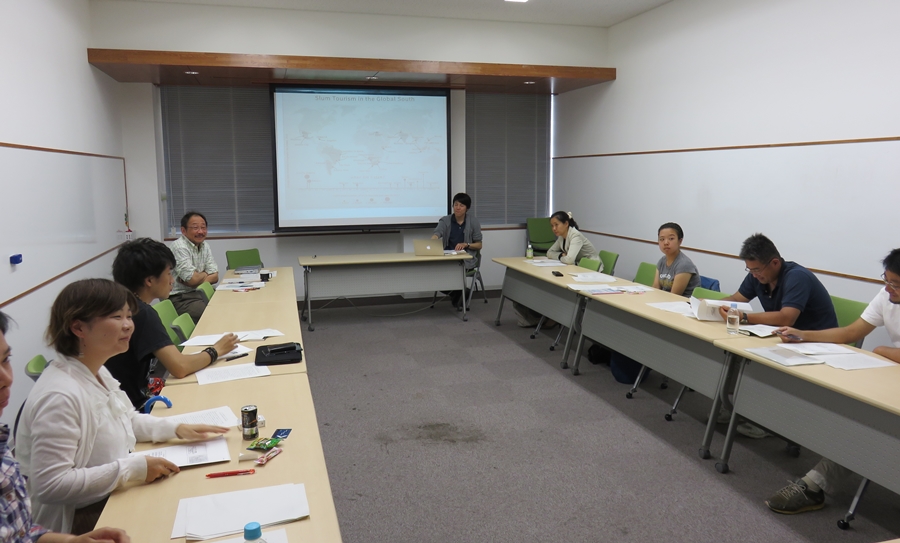
10:30-10:40
OHTA Itaru (Kyoto University)
Introduction
10:40-11:10
MATSUMOTO Tomoko (Nagoya University)
Change of Islamic education in Senegal society: A case study of Franco-Arab school
11:10-11:40
YAGI Tosuke (Ritsumeikan University)
Anthropological Study of Slum Tourism in Africa: With special reference to ‘Commercialized Persona’
Summary
Change of Islamic education in Senegal society: A case study of Franco-Arab school
MATSUMOTO Tomoko (Nagoya University)
Senegal has stated the principle of separation of government and religion in the constitution since its independence in 1960. Therefore, the secular curriculum, which French colonial government introduced, has been taking over in the official educational system even though the majority of people were Muslim. However, since 2002, public “Franco-Arab schools”, which implemented the bilingual education with French and Arab, have been constructing, and the number of school has been increasing up to now. In 2004 of the era of President Wade, Islam was introduced in the official curriculum according to the Amendment of Presidential Decree. Private “Franco-Arab schools” introduce official curriculum or develop appropriate education facilities because they want to be authorized by the government. Furthermore, the policy of modernization of “Daara” exists, which is Senegalese traditional Koranic School. The government wants to deal the number of participants in Daara as the number of students of official schools. These surrounding changes of Islamic education may affect on educational way; it has been situated in the informal sector and been well organizing and systemizing by Islamic Sufi leaders for a long time.
In this presentation, the change of Islamic education due to the introduction of Islam into the official curriculum will be discussed with a case of “Franco-Arab primary school.” The presenter did two field researches in 2014 and 2015 at two public and two private schools in Kaffrine and Kaolack regions. Interviews with students, parents, teachers and inspectors were conducted as well as collecting of related documents. After that, qualitative analysis on the change of traditional Islamic education was done with aspects of the educational system, students’ and parents’ expectations for Franco-Arab schools, and the change of their attitude towards Islamic education.
At public Franco-Arab primary schools, the curriculum, the textbooks and the examination system have been upgrading to some extent. The majority of students went on to the junior high schools in 2014 thanks to the policy with that they can go on to the junior high schools even if they cannot succeed in the examination of certificate of primary level. On the other hand, private schools are divided into the ones, which are deploying their own curriculum, and the others, which are following the government curriculum. Both of them tend to hope to be authorized by the government. The average age of students at private schools is higher than the public schools because they pass by Daara before entering into the primary school and come back to the schools after the experience of working, the marriage and the birth. This tells that the positioning of private Franco-Arab schools is different from the public ones.
Both students and parents at public and private schools expect at first to become a good Muslim through the school education. They prioritize to develop the basic human aspects as Muslim and follow the knowledge to survive in the life such as French and other secular subjects. Some students and teachers of private schools are living in the site of schools and being looked after by the Islamic leader. They seem to understand that the education is one of Islamic practices.
Franco-Arab schools are responding to the needs of people because they can learn Islam and the knowledge for the life at school. The number of students of Franco-Arab schools has increased and some of them are observed no to go to Daara or Arab school before entering to the primary schools. Further, the official curriculum and pedagogy are different from the traditional Islamic education institution.
Anthropological Study of Slum Tourism in Africa: With special reference to ‘Commercialized Persona’
YAGI Tosuke (Ritsumeikan University)
In the 1990s, slum tour in which people experience ‘slum culture’ in slums of the Global South began. There are several reasons why the slum tour has developed in the third world countries: 1) they are less expensive. 2) It develops pro-poor tourism aimed at poverty reduction. Until now, studies about slum tourism concentrate on 3 arguments: 1) motives of tourists. 2) A change of the recognition of tourists to slum culture through the slum experience. 3) The tourism development by country, an international organization and NGO. Arguments about inhabitants’ practice have had no place in these researches, therefore this research focuses on how people accept or cope with slum tour. On how they create a social space of their own for becoming a tourist attraction. The research was conducted on Nairobi, Johannesburg and Cape Town to understand the characteristic of slum tours. I investigated differences about the relation between inhabitants and tourists among three research areas.
First, I describe the contents of slum tour in Nairobi, Johannesburg and Cape Town and then analyze relationship between tourists and inhabitants in their areas. The standardization of tour content was seen in most companies in South Africa, and a place for sightseeing and the route that tourists visited were limited to the sites related to apartheid. In contrast, a lot of tours by “the informal sector” have been developed in Kenya. Therefore, there is possibility that slum tour is carried out in their private space of slum inhabitants, and their areas have accidental encounters between inhabitants and the tour.
I focus on ‘commodified persona’ that is created expediency to present their ‘culture’ for tourists in order to protect their life-world from drastic change by the tourism. The people living in multi-ethnic area such as slum not only manipulate ‘persona’ for tourists but also maintain a good relationship among the different ethnic groups. In this research, I focus on how they apply their daily practices of manipulating persona to tourism and how they re-establish their ‘life-world’ through the tourism. I would like to argue the ethic of slum tourism from the views of slum inhabitants.
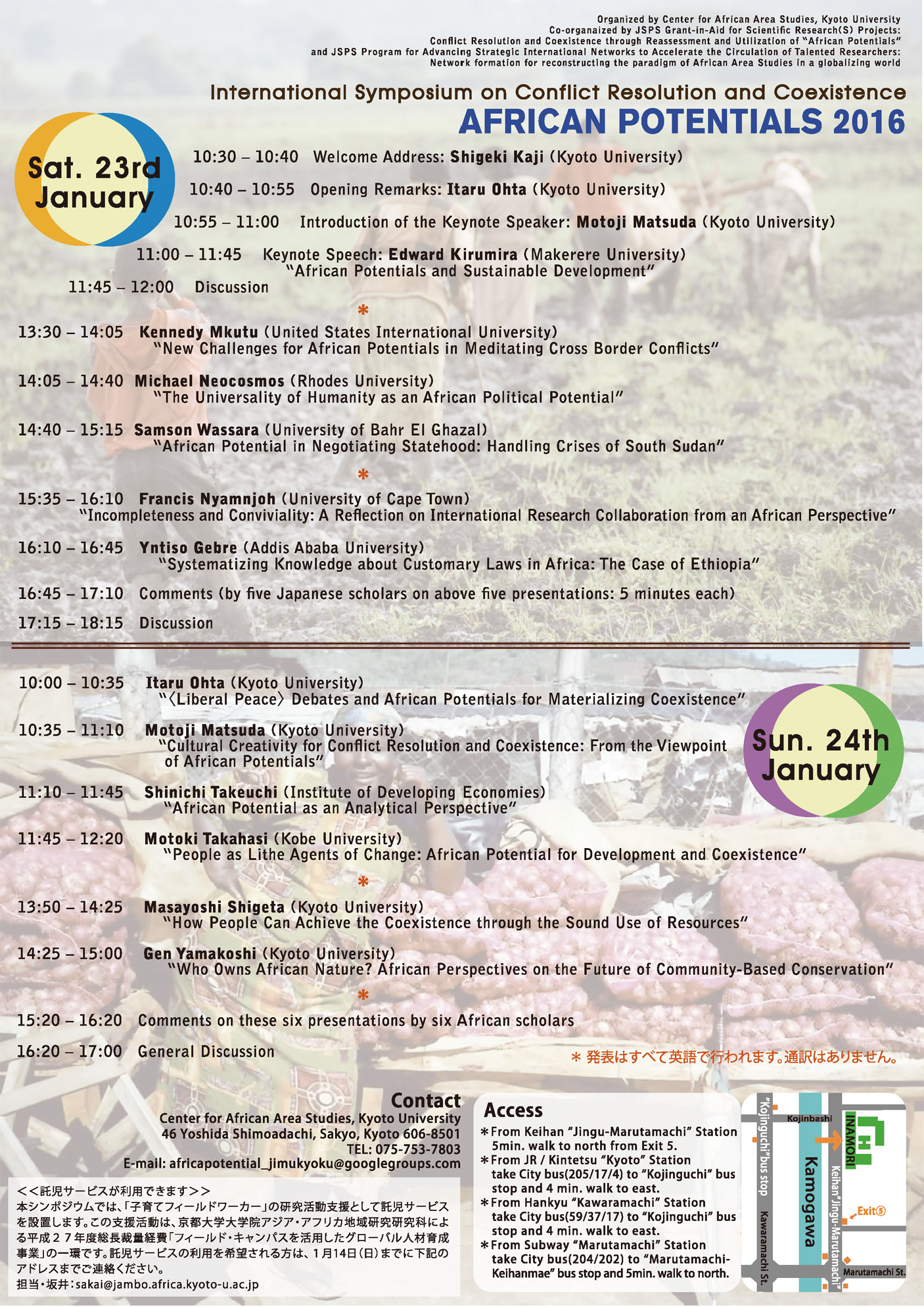
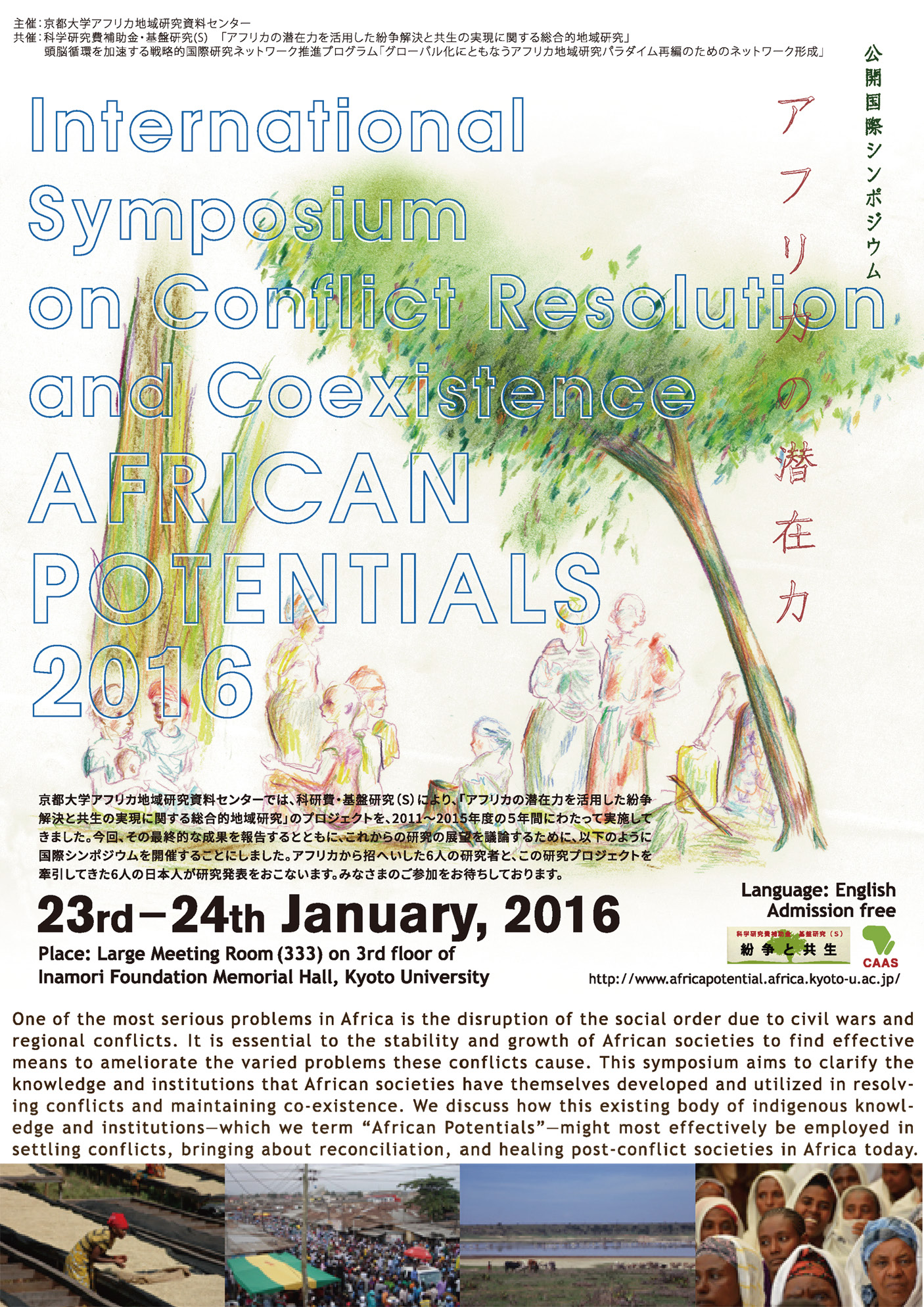
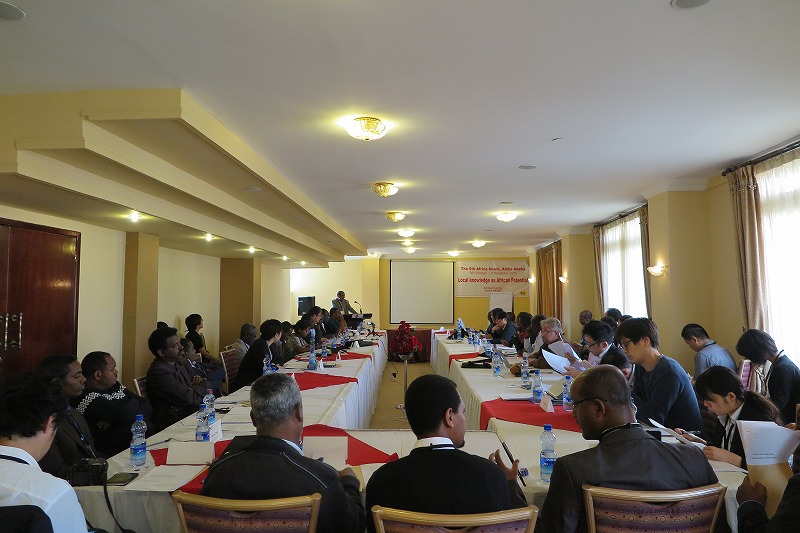
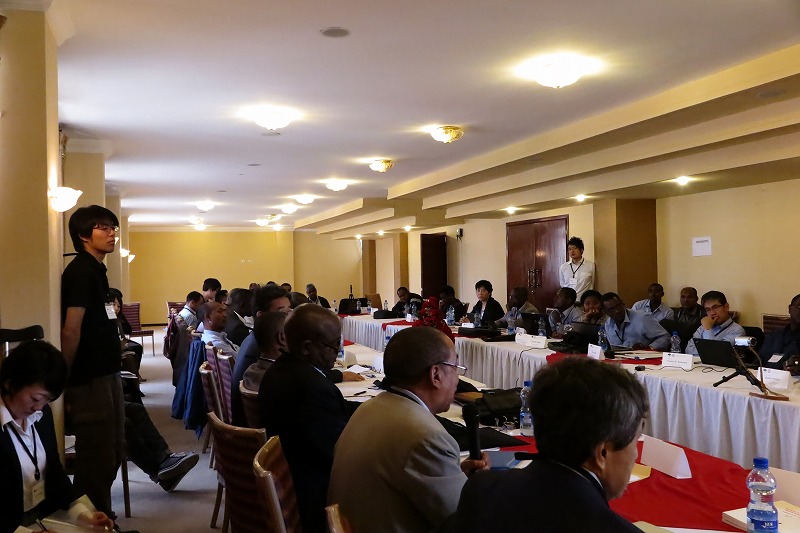

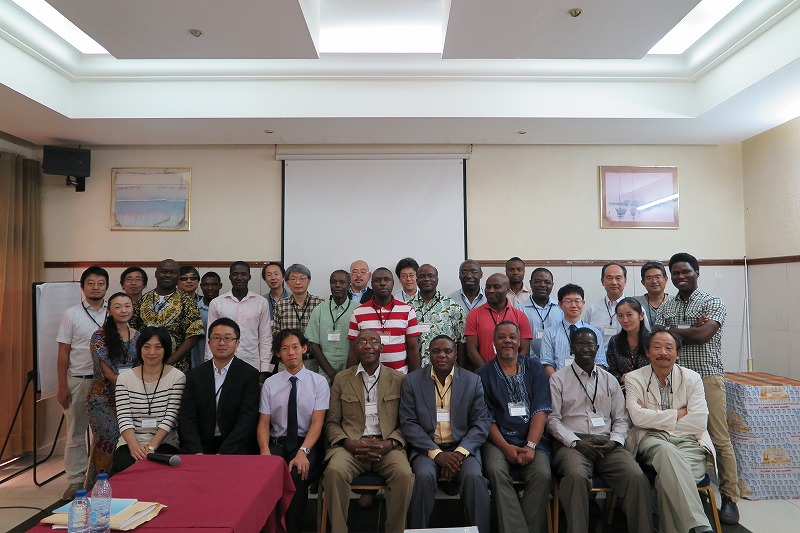
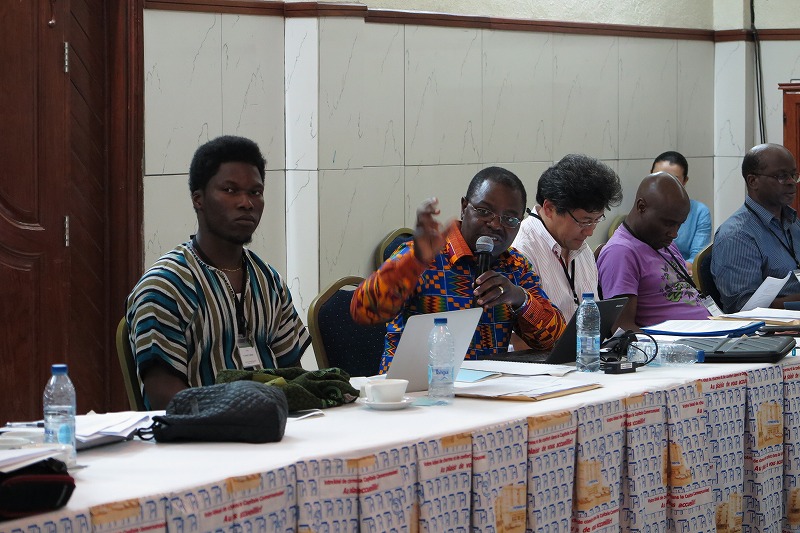
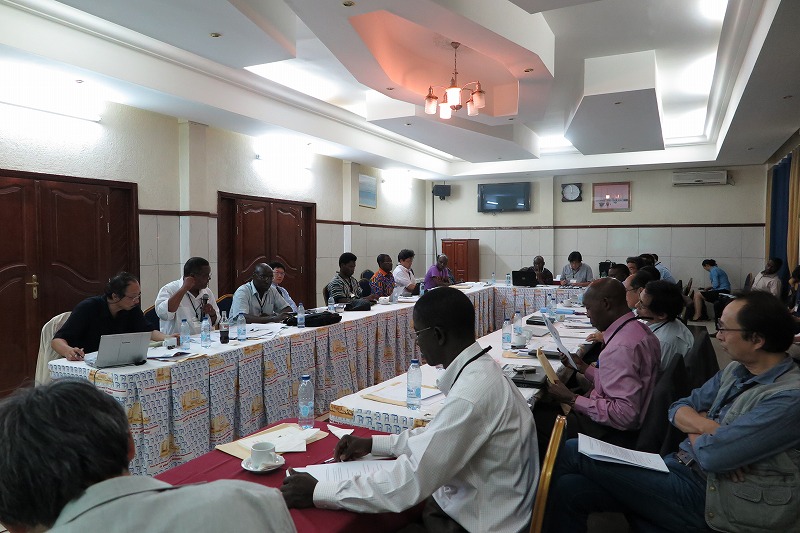

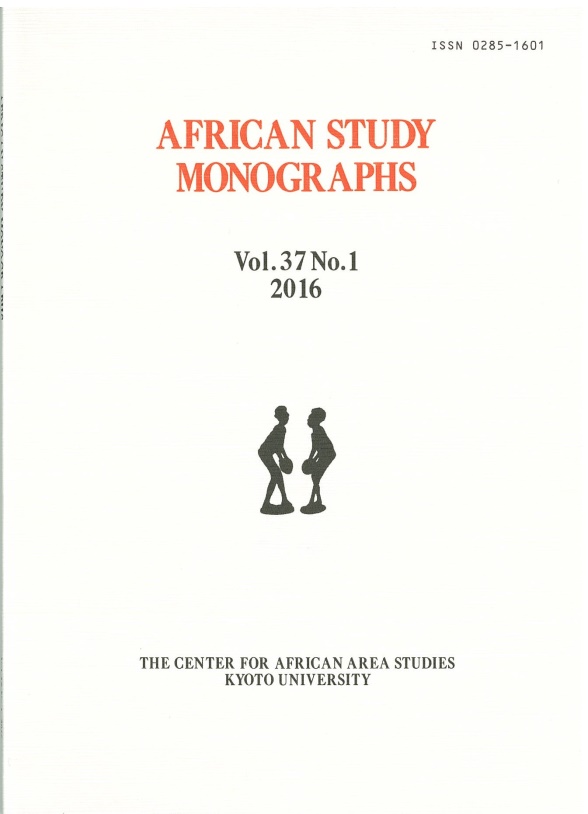
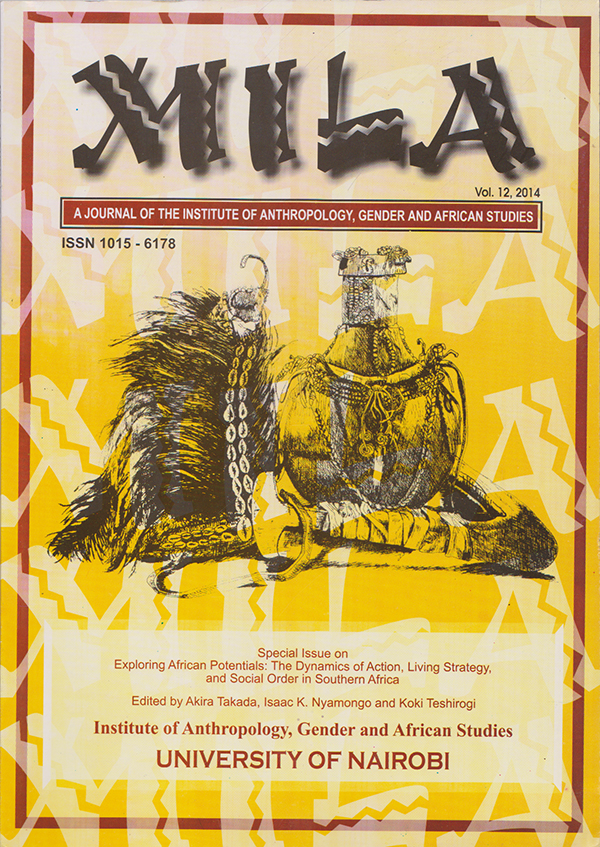 Exploring African Potentials, Mila Special Issue
Exploring African Potentials, Mila Special Issue